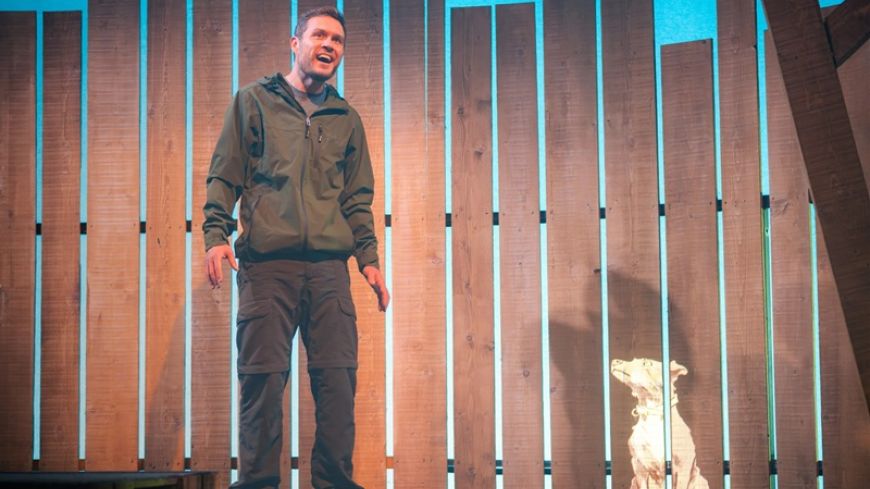
A moving, if distant, reflection on one man’s world.
First seen in 2022 as part of the popular ‘A Play, a Pie and a Pint’ lunchtime series, Man’s Best Friend has been restaged into an 80-minute production with Jemima Levick reprising her directorial duties and Jordan Young bringing the monologue to life, creating a vivid and touching show which sees out a Scottish tour with three nights at Edinburgh's Traverse Theatre.
Playwright Douglas Maxwell invites us deep into the fragmented world of Ronnie. Following a hard lockdown he starts walking his neighbours' dogs and what begins as an act of casual support becomes a lifeline.
From the outset, it’s clear something is awry: Ronnie is charming and funny, yet out of step with himself, relying on a self-taught Zen meditation routine borrowed from a Center Parcs advert. Beneath the laughter, Ronnie is stalked by grief and when the dogs escape into the woods, it becomes a metaphorical chase not just for lost pets but for the emotional truths he’s long been evading.
With humour, melancholy, and moments of poetic insight, the play builds a portrait not of a hero in the traditional sense, but of a man quietly unravelling and slowly stitching himself back together as we follow his story, touching on themes of grief, loneliness, identity, and the restorative power of connection - be it human or animal.
Young delivers a charismatic, subtle, and finely judged performance that captures both Ronnie’s warmth and restlessness. The dogs in his charge - Albert, Fury, Carlos, Coriander, and puppy, Rex - are not just comic relief but companions with their own quirks and emotional heft. Maxwell’s writing brings them to life through rich, colourful descriptions, supported by Ross Collins’ delightful illustrations. Becky Minto’s winding, green, plank-lined set evokes the embrace of the park, while Grant Anderson’s lighting charts the practical passage of time alongside the emotive light and shade of Ronnie’s psyche.
Still, for all its intimacy and finely tuned emotional beats, it doesn’t entirely escape the weight of its context. The pandemic is not just background; it frames and defines the play. While this anchoring in recent trauma is powerful and moving, it also creates a strange temporal distance. For some, Ronnie’s story may echo with painful familiarity while for others, it may feel like a moment already compartmentalised and the emotional currency dulled. In this way, the pandemic focus can create a subtle barrier to connection, even as the story works hard to draw us in.
Yet Maxwell’s gift lies in giving complexity and depth to the seemingly insignificant. His characters’ sensibilities, losses, and desires are always voiced and meaningful. Ronnie is a rounded, complex guy who intimately invites us into his perceived small, unimportant life and it takes a few runaway dogs and their surprising agency to pull him, and us, out of the woods.
It’s a powerful piece that immerses us in one man’s deeply poignant story in an enjoyable and worthwhile watch which highlights our need to connect with the world, and speaks to that urge that tells us to be of use, to be bigger, to be somebody.
Man’s Best Friend is at Traverse Theatre until Saturday 27 September.
Tickets here.
© Lindsay Corr, September 2025.

